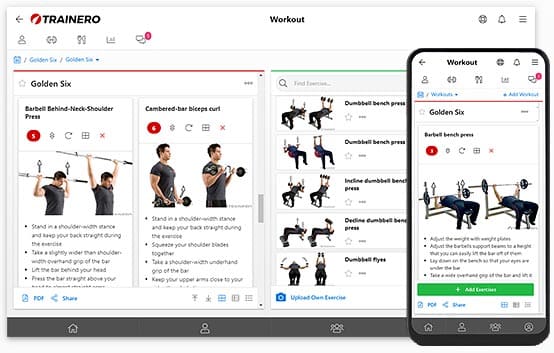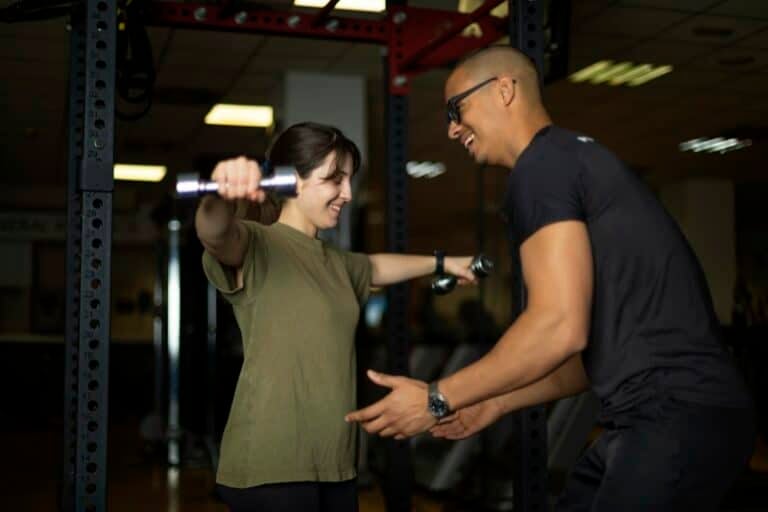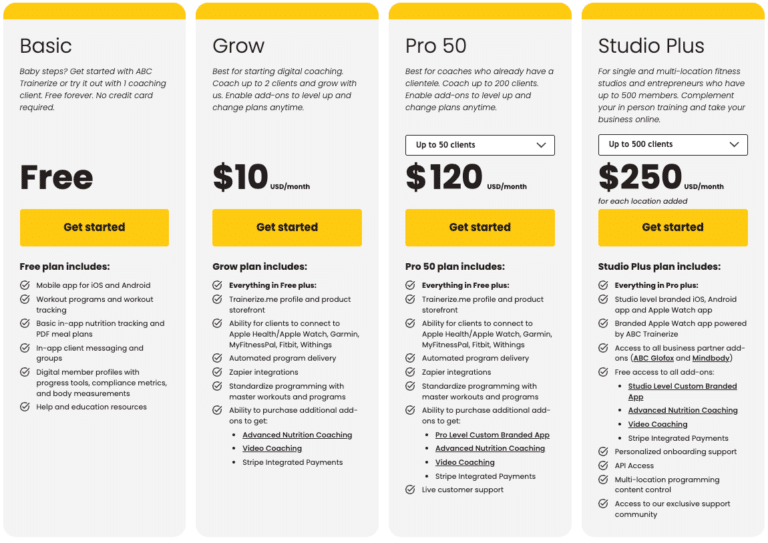Embarking on a career as a personal trainer is both rewarding and challenging. The fitness industry offers numerous opportunities for those passionate about health and fitness, making it an attractive path for many aspiring personal trainers. To succeed, one must possess a deep understanding of exercise science and the ability to communicate effectively with clients. Whether you are helping someone achieve their fitness goals or guiding them through a personal fitness training session, the role requires dedication and a commitment to continuous learning. In this article, we explore the essential knowledge and steps necessary to become a successful personal trainer, covering everything from certifications to choosing the right training programs.
Becoming a Successful Personal Trainer
Steps to Become a Certified Personal Trainer

Unlock your fitness potential with Trainero! Get a 14-day free trial and access personalized workout plans, expert coaching, and progress tracking—all in one app. No commitments, just results. Start your free trial today and take your fitness journey to the next level!

The journey to becoming a certified personal trainer begins with a strong foundation in exercise science and a passion for fitness and health. Aspiring personal trainers must first decide on a certification body that aligns with their career goals. Here are two organizations that offer comprehensive programs:
- National Academy of Sports Medicine (NASM)
- American Council on Exercise (ACE)
These programs cover the fundamental aspects of personal training. Completing them provides the knowledge and confidence needed to effectively guide clients of varying fitness levels. Additionally, obtaining certification demonstrates a trainer’s commitment to professionalism and excellence, setting the stage for a successful fitness career.
Essential Qualifications and Certifications
To thrive as a fitness professional, obtaining the right qualifications is crucial. Certifications are the cornerstone of a personal trainer’s credentials, showcasing their expertise and dedication to the field. Beyond basic certifications, trainers can pursue specialized credentials in areas such as sports performance, nutrition, or corrective exercise, enhancing their ability to meet diverse client needs. Fundamental knowledge of anatomy, physiology, and kinesiology is essential for designing safe and effective fitness routines. Furthermore, the best personal trainers continually update their skills through workshops and seminars, ensuring they remain at the forefront of industry trends and innovations. This continuous learning is key to maintaining a competitive edge in the fitness industry.
Choosing the Right Fitness Trainer Program
Selecting the right fitness trainer program is a critical step for anyone looking to become a personal trainer. With numerous options available, aspiring trainers must consider factors such as accreditation, curriculum, and support services. A comprehensive program should offer in-depth coverage of topics like exercise science, client assessment, and the development of personalized fitness plans. Additionally, practical experience through supervised training sessions is invaluable for honing skills for personal trainers. Programs that offer mentorship from a master trainer or provide opportunities for networking within the fitness industry can further boost a trainer’s career prospects. Ultimately, the right program will equip trainers with the knowledge and business skills necessary to excel in their chosen path.

Skills for Personal Trainers
Key Skills Every Trainer Should Have
Every personal trainer must possess a diverse set of skills to excel in the fitness industry. A successful personal trainer needs to have a solid grounding in exercise science, enabling them to design effective and safe fitness routines tailored to individual client needs. The ability to communicate effectively is crucial, as trainers need to clearly convey instructions and motivate clients to reach their fitness goals. Additionally, problem-solving skills are essential for adjusting training sessions to accommodate varying fitness levels and addressing any unexpected challenges. The best personal trainers are also adept at time management, ensuring each client receives the focused attention they deserve. These fundamental skills are vital for anyone looking to thrive in a career as a personal trainer.
Empathy for Clients: Understanding Their Needs
Empathy is a cornerstone of personal training, allowing trainers to understand and connect with their clients on a deeper level. Recognizing and appreciating a client’s unique fitness and health challenges is essential for building trust and fostering a supportive training environment. By empathizing with clients, a trainer can better tailor programs to suit individual fitness goals and personal circumstances. This sensitivity to client needs not only enhances the effectiveness of the training program but also increases client satisfaction and retention. A personal trainer must be attuned to both the physical and emotional aspects of personal fitness training, thus ensuring a holistic approach to health and wellness. Empathy ultimately transforms the trainer-client relationship into a partnership aimed at achieving shared fitness objectives.
Business Skills for a Thriving Fitness Career
Beyond technical expertise, personal trainers must also cultivate strong business skills to ensure a thriving fitness career. Understanding the fundamentals of marketing, client acquisition, and financial management can significantly impact a trainer’s success. Effective marketing strategies help trainers reach potential clients and communicate the value of their services. Managing client relationships is another critical aspect, as satisfied clients often become repeat customers and valuable sources of referrals. Moreover, trainers should be adept at setting competitive pricing and managing their finances to maintain a profitable business. Continuous learning about industry trends and business practices can provide aspiring personal trainers with the edge needed to stand out in the competitive fitness industry and sustain long-term success.
Marketing Skills for Personal Trainers
Building Your Brand as a Personal Trainer
Building a strong brand is essential for any personal trainer aiming to stand out and attract clients. A personal trainer must develop a unique identity that reflects their expertise, personality, and approach to fitness. This involves creating a consistent message across all platforms, from business cards to social media profiles, showcasing what sets them apart from other fitness professionals. A successful personal trainer brand should highlight their specializations, such as experience in sports performance or nutrition, to appeal to specific client needs. By establishing a reputable brand, aspiring personal trainers can enhance their visibility and reputation in the fitness industry, ultimately leading to increased client trust and business growth.
Effective Marketing Strategies for Fitness Professionals
Implementing effective marketing strategies is crucial for personal trainers looking to build a sustainable career in the fitness industry. Trainers must leverage both traditional and digital marketing techniques to reach potential clients. Key strategies include:
- Hosting workshops or seminars to demonstrate expertise and establish credibility within the community.
- Maintaining an engaging website with detailed information about personal fitness training services and testimonials from satisfied clients.
Additionally, offering introductory sessions or promotions can entice potential clients to experience the trainer’s methods firsthand. By combining various marketing tactics, a certified personal trainer can effectively communicate their value, achieving their fitness goals of client acquisition and retention.
Utilizing Social Media to Attract Clients
Social media is an indispensable tool for personal trainers aiming to expand their client base and enhance their visibility. Platforms like Instagram, Facebook, and TikTok allow trainers to showcase their expertise through engaging content, such as workout videos, client transformations, and fitness tips. These platforms enable trainers to interact directly with their audience, answering questions and providing personalized advice, which helps build trust and rapport. Additionally, social media offers opportunities for trainers to collaborate with other fitness professionals or brands, further increasing their reach. By consistently sharing valuable content and engaging with followers, trainers can effectively utilize social media to connect with potential clients, reinforcing their brand and establishing themselves as successful personal trainers in the fitness community.
Promoting a Healthy Lifestyle
Guiding Clients in Nutrition and Wellness
In the journey of personal training, guiding clients in nutrition and wellness is pivotal. A personal trainer must possess a deep understanding of dietary principles to effectively assist clients in achieving their health and fitness goals. Proper nutrition is a fundamental aspect of any fitness routine, impacting energy levels, recovery, and overall performance. The trainer’s role is to educate clients on balanced diets, portion control, and the importance of hydration, tailoring advice to suit individual dietary needs and preferences. By integrating nutrition guidance with exercise science, personal trainers can offer a holistic approach to wellness, ensuring clients not only meet their fitness goals but also adopt sustainable health habits that enhance their quality of life.
Encouraging Sustainable Fitness Habits
Encouraging sustainable fitness habits is a cornerstone of effective personal training. A successful personal trainer recognizes that fostering long-term commitment to health and fitness requires more than just guiding clients through training sessions. It involves educating them on the benefits of consistency and the significance of incorporating physical activity into their daily lives. Trainers must inspire clients to view exercise not as a temporary goal but as a lifelong pursuit, adapting fitness routines to fit their lifestyle and fitness levels. By promoting enjoyable and achievable activities, trainers help clients build a positive relationship with exercise, enhancing motivation and adherence. Cultivating these habits leads to lasting transformations and empowers clients to maintain their fitness journey independently.
Creating Customized Fitness Plans
Creating customized fitness plans is essential for any personal trainer aiming to meet the unique needs of their clients. Each individual comes with different fitness levels, goals, and challenges, and a one-size-fits-all approach is rarely effective. A certified personal trainer must assess client needs through comprehensive evaluations, considering factors like physical condition, exercise history, and personal preferences. By leveraging their expertise in exercise science, trainers can design personalized fitness programs that align with the client’s objectives, whether it’s weight loss, muscle gain, or enhanced athletic performance. These tailored plans not only address specific goals but also ensure safety and effectiveness, ultimately leading to client satisfaction and progress in their fitness journey.

Unlock your fitness potential with Trainero! Get a 14-day free trial and access personalized workout plans, expert coaching, and progress tracking—all in one app. No commitments, just results. Start your free trial today and take your fitness journey to the next level!











